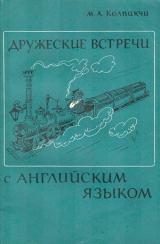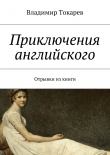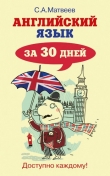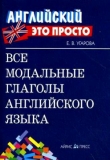
Текст книги "Дружеские встречи с английским языком"
Автор книги: Мария Колпакчи
Жанр:
Языкознание
сообщить о нарушении
Текущая страница: 24 (всего у книги 24 страниц)
ACTIVE VOICE
Present Indefinite. The journalist L. Sidorovsky writes in the Leningrad newspaper «Smena».
Past Indefinite. Valentin Pikul wrote a very good novel about the participation of Murmansk fishermen in the Second World War.
Future Indefinite. We expect that General Lagutkin will write his memoirs.
Future Indefinite in the Past. The men and girls of the Leningrad Red Banner Air Raid Defence hoped that K. Simonov would write a novel about the heroic activities of the whole population of Leningrad regardless of age and health.
Present Continuous. I am writing to you, I cannot help it.
Past Continuous. Everybody left the Editorial Office, but I was still writing my account.
Future Continuous. Children, don't be noisy, father will be writing a very important article in his study.
Future Continuous in the Past. I thought I should be writing letters the whole afternoon, but I had a headache and had to lie down and take some pills.
Present Perfect. Dora has never written such nonsense in her letters!
Past Perfect. Kitty had written «An Open Letter to the Readers» before the manager rang up and said it was unnecessary.
Future Perfect. The director of the printing shop says he will have written the promised editorial by six p.m.
Future Perfect in the Past. The poet D. said he would have written an epigram by the beginning of the evening party.
Present Perfect Continuous. You have been writing this little fairy tale for a month and cannot bring yourself to finish it.
Past Perfect Continuous. I had been writing this exercise for three hours but the electricity went out and I could not finish it.
Future Perfect Continuous. Mother will have been writing the New Year greeting-cards the whole afternoon till it is time to go to the theatre.
Future Perfect Continuous in the Past. She insisted that I should have been writing for two hours by the time she came home from the cinema.
PASSIVE VOICE
Present Indefinite Passive. The best poem about Lenin is written by Mayakovsky.
Past Indefinite Passive. The script of the TV film transmitted yesterday was written by an unknown author.
Future Indefinite Passive. Lots of poems and songs will be written for the great Anniversary by our poets and composers.
Future Indefinite Passive in the Past. The teacher said that the next test paper would be written in a week.
Present Continuous Passive. Wait a moment, the article is being written, it will be ready in ten minutes.
Past Continuous Passive. This document was being written by the lawyer during half an hour.
Present Perfect Passive. The letter of condolence has just been written and I feel like going for a walk.
Past Perfect Passive. Many diaries that had been written by Leningrad juornalists, students and even schoolchildren during the war were destroyed by bombing and fire.
Future Perfect Passive. Answers to three business letters from Manchester will have been written by 3 p. m.
Future Perfect Passive in the Past. This letter would not have been written had he not been in such low spirits.
ДРУГУ-УЧАЩЕМУСЯ
Книга, которую вы держите в руках – не учебник, а только спутник учебника, товарищеская беседа между взрослым читателем и человеком, любящим английский язык, не педагогом по профессии, а журналистом, которому, однако, пришлось годами преподавать этот язык, как уже рассказывалось в книге.
Возможно, что термины «братья-артикли», «схемы, которые радуют», «змеи», «Ванька-встанька» и в особенности «лягушка» покажутся кое-кому странными и даже не вполне уместными в применении к языковым явлениям. Но это не так! Открывая дверь в аудиторию, я всегда думаю о том, насколько успешнее идет усвоение языка, когда на лицах учащихся мелькает улыбка. И, кроме того, преподавать, как мне кажется, – это значит одушевлять предмет, о котором рассказываешь, превращаться в него: самой уподобиться то артиклю, то глаголу to do, то «лягушке» и действовать согласно обстоятельствам. Если благодаря этому исчезает скука – значит легче достичь цели.
Мы, конечно, стремимся к тому, чтобы учащиеся полюбили читать в оригинале произведения мастеров английской литературы, которыми с детства зачитываются все. Десятки английских авторов сопровождают нас всю жизнь. Отрывки, цитаты из их сочинений полезно запоминать, их афоризмы обогащают ум и душу.
Почему же в этой книжке встречаются переводы с русского, а не только цитаты из произведений английских писателей?
Потому что взрослые люди не сразу начинают думать по-английски. Так не бывает. Для английских читателей это родной язык, а русскому учащемуся такое чувство языка дается лишь в результате многолетней учебы и практики, в которую входят и переводы с русского языка на английский.
И вот когда учащийся встречает в английском варианте давно знакомую русскую пословицу, цитату из произведения отечественного писателя, которую знает наизусть, и т. д., у него возникает мысль: может быть, не так уж сложно, попробую-ка я перевести на английский. Например:
«Пусть всегда будет солнце, Пусть всегда будет небо, Пусть всегда будет мама, Пусть всегда буду я!» Let it always be sunshine, Let it always be blue skies, Let it always be mummy, Let it always be me!
«Лес увидим в полной силе, Это мы его растили» We'll see the forest in its might That we have grown with our hands.
Или пушкинское:
«Чем меньше женщину мы любим, Тем легче нравимся мы ей…» The less we care for any woman The easier we win her heart.
Как часто еще в 1971 г. стояла я в книжных магазинах, когда на полке голубело первое издание «Дружеских встреч». Всматривалась в лица людей, перелистывавших книжку. Бывало, начинался разговор, кончавшийся автографом.
Рассказав об этом Борису Александровичу Ильишу, дорогому профессору, скромному человеку, я порадовалась, когда он признался, что когда вышла его первая книга, он, совсем еще молодой человек, бегал по книжным магазинам, следя за тем – унесут ли книгу те, кто взял ее в руки.
So, good luck, my dear readers. I’ll be happy if my book proves helpful to you.








